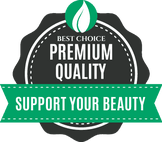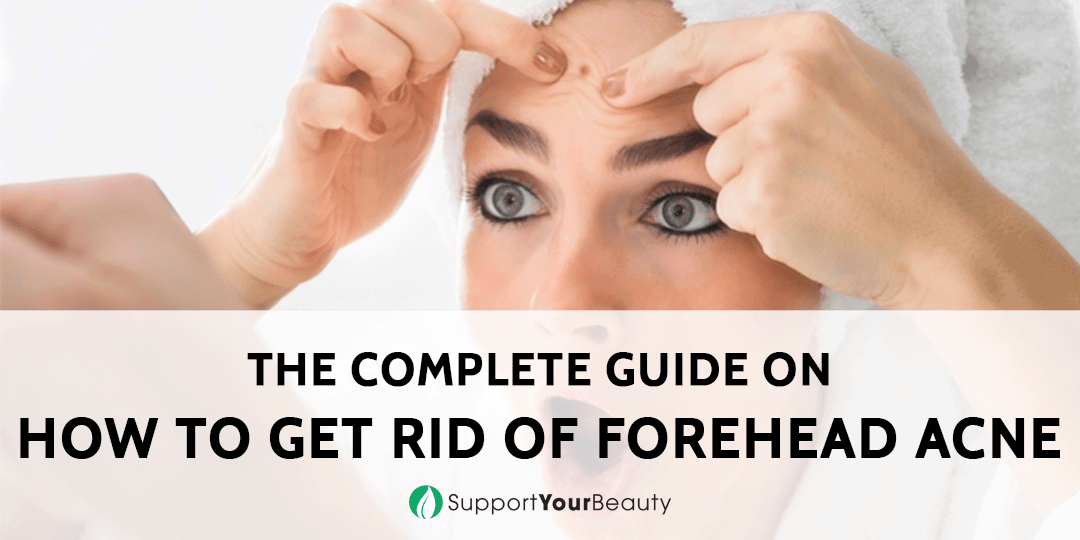
Do you know what causes your acne in the first place? We've walked all the long way to help you find out how to get rid of forehead acne.
For most people, it’s no surprise that they’re having acne problems on their forehead. Since of course, the forehead lies in the “T-zone” in which most of the natural oils of our faces are produced.
But little do people know that clogged pores are the least of their problems. The root of their forehead acne trouble actually goes beyond that.
The real cause of your forehead acne problems is stress. But lucky for you, we’ve listed all the best tips on how to treat forehead acne and how to prevent it from ever coming back.
More...
What Causes Forehead Acne
According to my research, stress is the main culprit in the production of forehead acne.
But other factors such as an unhealthy diet, certain hair products, oil-based cosmetics, hats, and over-exfoliation can also contribute to the breakout.
1. You Have a High Level of Stress
Stress is definitely on the top of this list!
And I can certainly vouch for this based on my many experiences. I get the worst breakouts on my forehead when I’m stressed or when I don’t get enough sleep. Same goes for my friends.
In school, we have this so-called “hell week” when everyone’s extremely stressed in finishing all of their projects and don’t even have time to sleep properly. I could’ve sworn we all looked liked zombies with zits.
On another related note, according to traditional Chinese medicine, your face is a window through which you can see your health.
Every part of your face corresponds to specific organs in your body. As for the forehead, specifically the lower part, it is associated with the mind and spirit.
And as I mentioned earlier, if you have an acne breakout in this area, it may be due to irregular sleeping patterns, stress, anxiety, and depression.
2. You Have An Unhealthy Diet
As I mentioned above, acne outbreak on the lower forehead is associated with the mind. But for the upper forehead, traditional Chinese medicine states that it is directly linked to your digestive system.
When you're experiencing poor digestion that's most likely due to too much consumption of oily foods, your body will have a lot of troubles breaking down food, and there may be a massive buildup of toxins. It may also indicate liver problems.
Try to eat a lot more antioxidant rich foods or drinks such as deep-colored fruits, green tea, vegetables, red wine, and dark chocolate.
3. Your Hair Products
Much of what we apply to our hair can easily drop down to our foreheads and can clog up the pores which can quickly result in acne. Hairsprays, hair gels, and pomades tend to be the most acne inducing hair products.
In addition to oily hair products, having an oily scalp can also trigger forehead acne. The combination of the two can lead to excess sebum and eventually acne.
4. Your Oil-based Cosmetics
Contrary to popular belief, not all cosmetics can make your acne worse. You only need to watch out for oil-based make-up.
These types of beauty products can mix with the already abundant natural oils on your face and produce excess sebum that can clog up your pores and result in acne.
It is prudent, however, to always remove your makeup (even if it’s not oil-based) before going to bed to avoid clogging up your pores and thus causing skin irritation leads to acne.
5. Your Hats
Sweat is inevitable when we wear hats or any headwear. Not to mention the leftover sweat from the last time you wore it. All this sweat, combined with the natural oils our skin produces, and you’ve got a recipe for disaster.
And as all of this sweat gets trapped around the hat line, the excess oils can clog up the pores and result in an acne breakout.
But the fear of having acne shouldn't mean the end of your hat-wearing days. Just be sure to take extra measures when it comes to caring for your skin and don't forget to clean your hat/helmet more often.
6. You Are Over-Exfoliating
Don't get me wrong; gentle exfoliation is a great way to get rid of dead skin cells and get that radiant glow. But over-exfoliation can cause irritation to already sensitive skin, causing acne to take longer to heal.
Over-exfoliation can also dry out the skin. And when your skin is dry, oil production goes into overdrive resulting in excess sebum that clogs up pores and creates even more acne.
When used aggressively, physical exfoliators such as face scrubs can burst whiteheads causing the bacteria to spread around your face and make the acne worse.
How To Prevent It Before Having It
As the old saying goes, "the prevention is better than cure."
So before diving into what needs to be done to get rid of those forehead acnes, Below are several tips that can actually help you avoid ever getting them in the first place.
1. Seeing as stress is the primary cause of forehead acne. Try to take some time to de-stress your mind.
Find ways to relax, such as:
- taking a long bath
- watching a favorite movie
- doing some meditation exercises
And if none of those work, you can always go on a spa day with friends.
2. Irregular sleeping patterns can also lead to forehead acne. So from now on, try to get as much sleep as you can; ideally getting to bed before 11 pm. The earlier, the better.
3. As mentioned above, forehead acne may suggest that you have poor digestion.
To avoid this, here’s a list of foods you may want to steer clear of:
- fried food
- fatty & oily food (butter, ice cream, red meat, and cheese)
- spicy food (chili peppers)
- acidic food (tomato sauce and citrus fruits)
- artificial sweeteners
4. Avoid focusing on a single area on the scalp when using hair products like shampoo or styling gel. This can lead to the production of excess oils that will leave your scalp greasy and your forehead more prone to acne.
5. Pull your hair back in a ponytail more often to avoid letting it rest on your forehead. The chemicals you’ve applied to your hair can easily get trapped in the pores and lead to acne.
6. Never forget to remove your makeup before going to bed! It will only lead to clogged pores and an immense acne breakout.
7. Avoid excessive use of headwear (hats, caps, and helmets). But if you’re an athlete wherein wearing a helmet is a must, make sure to clean it after using it. The leftover sweat not only promotes acne breakouts but is also a breeding ground for bacteria.
8. Be careful not to over-exfoliate. You'd think that frequently scrubbing your face would keep it clean enough that acne wouldn't be a problem. But just remember, when you do it too much can have the opposite effect.
How To Get Rid Of Forehead Acne
Getting rid of forehead acne is somewhat similar to getting rid of just natural acne. Although, as mentioned above, the main reasons why you get it are different from other areas on your face.
So as much as possible, follow the tips above to help you avoid ever having forehead acne and save you all this trouble in getting rid of them.
But if you're suffering the embarrassment of having some on your forehead already, we've listed down all the best remedies to help you get rid of that forehead acne.
1. Benzoyl Peroxide
Benzoyl peroxide is a well-known medication that treats mild to moderate acne. It works by unclogging skin pores and reducing acne-causing bacteria. Before using it, though, check if you're allergic to it.
Look for an antibacterial wash that has benzoyl peroxide as the active ingredient with a 2.5% or 10% concentration. Wash your face with it for at least twice a day.
At first, your acne may get worse, and your skin may redden and peel. But don't panic. That's perfectly natural. You may need to use the product for as long as 4 to 6 weeks before your acne starts improving.
2. Salicylic Acid
Salicylic acid is considered one of the most commonly seen ingredients in acne treatment products; along with benzoyl peroxide. However, unlike benzoyl peroxide, it doesn't have the ability to kill bacteria that causes acne.
For that reason, I recommend using a product with both salicylic acid and benzoyl peroxide in it. Although, salicylic acid alone can help in unclogging pores. It also works better for those with dry skin.
After washing with the benzoyl peroxide antibacterial wash, completely dry the affected area. Apply the ointment that contains at least 0.5% concentration of the salicylic acid. Then rub it in gently.
3. Glycolic Acid
Glycolic acid works by loosening the bonds between the top layers of skin cells to quickly remove dead and damaged cells. By gently exfoliating your skin, it helps prevent the buildup of dead skin cells that can lead to clogged pores and the formation of acne.
It also helps reduce skin inflammation by removing the dry and flaky skin cells. And by doing so, it can increase the moisture content of the skin.
Apply it the same way as you did with the salicylic acid. Wash your face first with the benzoyl peroxide antibacterial wash. Then completely dry your face. Afterward, apply the glycolic acid with a 10% concentration.
4. Tea Tree Oil
Tea tree oil is widely known for its antibacterial properties that help fight against acne-causing bacteria. With its disinfecting and soothing properties, it unblocks the pores to reduce acne breakouts.
It’s an excellent alternative to harsh synthetic chemicals as it doesn’t strip your skin of its natural oils which can lead to further damage.
You can directly apply tea tree oil to the affected area (in this case, your forehead). But only with a 15% concentration or lesser. Dilute with water if the concentration is higher.
After washing with an antibacterial wash, simply pour a few drops of the tea tree oil onto a cotton pad and gently dab it onto the acne. Leave it for a few hours or so and you’ll see that the redness and swelling have decreased.
5. Apple Cider Vinegar
Apple cider vinegar contains antiseptic and anti-bacterial properties which can kill acne-causing bacteria. Also, the alpha-hydroxy acid present in it helps in unclogging the pores by exfoliating dead skin cells and other impurities.
When applied to the acne, it can reduce the redness, swelling, and pain due to its anti-inflammatory properties. It also consists of minerals and vitamins that help in speeding up the healing process and reduce scarring.
Just pour a small amount of the apple cider vinegar to a cotton ball and apply it on the affected areas. You can leave it to dry completely and then rinse with water and pat dry.
The Bottom Line
As I've said over and over again in this article, stress is the primary source of your forehead acne problems.
And although there are still some factors that can contribute to your breakout in that area, trust me when I say that everything you need is some relaxation.
As I’ve mentioned earlier, “the prevention is better than cure.” So put those feet up and just give yourself some time to relax, unwind, and de-stress your mind.
That may be the most useful advice you can get in preventing forehead acne from ever popping up again.

